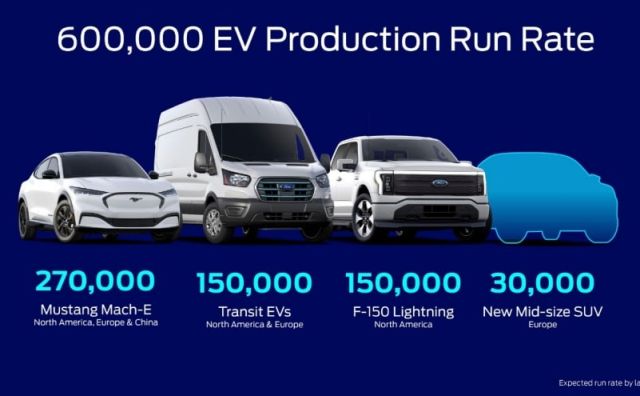Ford Motor Company has revealed its revised plans for its electric vehicle business in the wake of dominance of China in the EV market.
Ford Motor, which will provide an update on its electrification, technology, profitability and capital requirements in the first half of 2025, says its goal will be ensuring profitable and capital-efficient EV business.
For the second-quarter of 2024, Ford Model e posted an EBIT loss of $1.1 billion amid pricing pressure on electric vehicles.
Ford is expecting capital expenditures of $8 billion – $9 billion for 2024.
Ford, according to its North America vehicle roadmap, offer a range of electrification options designed to speed customer adoption – including lower prices and longer ranges.
Ford will prioritize the introduction of a new digitally advanced commercial van in 2026, followed by two new advanced pickup trucks in 2027 and other future affordable vehicles.
Ford also realigned its U.S. battery sourcing plan to reduce costs, maximize capacity utilization, and support current and future electric vehicle production.
“We are committed to innovating in America, creating jobs and delivering incredible new electric and hybrid vehicles that make a real difference in CO2 reduction,” said Ford President and CEO Jim Farley. “We learned a lot as the No. 2 U.S. electric vehicle brand about what customers want.”
Ford Motor will cancel a planned three-row electric SUV and delay the launch of a new electric version of its popular F-150 pickup truck, Reuters news report said.
The decision to delay or cancel new EV models isn’t unique to Ford. General Motors and other carmakers have taken similar steps, pausing significant investments in vehicles that aren’t selling as rapidly as expected.
Ford’s CEO, Jim Farley, has underscored the importance of reducing production costs for EVs as a critical factor in the company’s long-term success. With Chinese competitors and Tesla continuing to lower the cost of EV production, Ford is channeling significant resources into developing a new architecture for affordable EVs. This new technology is expected to debut in a mid-sized electric pickup truck slated for release in 2027.
Despite these strategic shifts, Ford’s challenges remain significant. The company is expected to incur a non-cash charge of approximately $400 million for the write-down of assets related to the now-canceled three-row SUV project, with potential additional expenses reaching up to $1.5 billion.
Moreover, Ford is making moves to align its battery production with incentives under the U.S. Inflation Reduction Act (IRA). This includes relocating some battery production to Michigan and advancing plans for lithium iron phosphate (LFP) battery production by 2026, using technology licensed from China’s CATL.
While Ford’s EV share of its annual capital spending will decrease, the company is positioning itself for long-term success by focusing on affordability, both in vehicle pricing and battery production.

